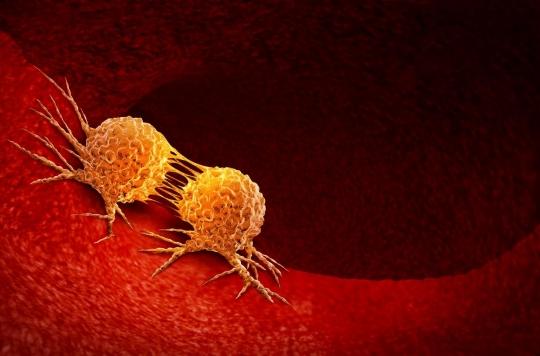A new drug that inhibits a cancerous mutation in the KRAS gene has shown encouraging results in patients with lung cancer, colorectal cancer and other solid tumors.

- Of patients with KRAS-mutated lung cancer, nearly half received an objective response to the new drug, adagrasib.
- Adadagrasib has also shown evidence of disease control in patients with colorectal cancer and other solid tumours.
- The clinical trial, which is ongoing, offers hope of treatment for patients affected by a mutation in the KRAS gene, an oncogene responsible for tumors that are very resistant to standard treatments.
For decades, scientists have been trying to develop new drugs that target the KRAS gene mutation, one of the most well-known oncogenes. A new clinical drug trial, presented at the 32nd EORTC-NCI-AACR Symposium on molecular targets and anti-cancer therapies, is this time yielding promising results.
Called adagrasib, this new treatment has shrunk tumors from many cancers, including non-small cell lung cancer (NSCLC), colorectal cancer, as well as other solid tumors like pancreatic, endometrial and ovaries.
A significant reduction in lung tumors
Adadagrasib targets a KRAS gene mutation called G12C, which causes tumors that are more resistant to standard treatments. The KRAS G12C mutation is present in approximately 14% of lung adenocarcinomas, 4% of colorectal cancers and 2% of pancreatic cancers. This means that it affects well over 100,000 people every year worldwide.
Initiated in January 2019, the KRYSTAL-1 Phase I/II clinical trial of adagrasib was conducted at more than 50 sites in the United States. At the start of phase I and Ib of the trial, patients with advanced CNCP, colorectal cancer and other solid tumors with the KRAS G12C mutation were recruited. All had received standard treatment for their cancer, including chemotherapy and immunotherapy. As part of the trial, they received 600 mg of adagrasib by mouth, twice a day.
Of the 51 lung cancer patients who participated in the trial, 45% had an objective response to treatment. This means that their tumors have shrunk by 30% or more and have not grown or spread to other parts of the body. In addition, the disease control rate was 96%, “meaning that 49 of the 51 patients showed a partial or complete response or had stable disease”details Dr. Pasi A. Jänne, professor of medicine at Harvard Medical School.
An effective therapy against colorectal cancer
The results of adagrasib are also encouraging in patients who have developed colorectal cancer. Of the 18 who could be evaluated, three (17%) had a confirmed objective response and two of them are continuing to receive treatment. Disease control was observed in 17 of the patients (94%) and 12 of them continue to be treated.
Same observation in the six patients with other solid tumors that could be evaluated. A partial response was confirmed in one patient with endometrial cancer and one patient with pancreatic cancer. Unconfirmed partial responses were observed in one patient with cancer of the ovaries and another with cancer of the bile ducts (cholangiocarcinoma). The six patients continue to follow the treatment.
Researchers also analyzed treatment-related adverse side effects in the 110 patients included in Phases I/Ib and II of the trial, including those with colorectal cancer and other solid tumors, as well as those with NSCLC. . Side effects included nausea for 54% of patients, diarrhea (51%), vomiting (35%), fatigue (3%) and increased levels of an enzyme that indicates mild liver irritation (20%).
“Patients with KRAS G12C are a population for which there are no proven targeted therapies. When chemotherapy or immune therapy fails in a patient, treatment options are limited. The fact that we are seeing responses in 45 % of patients, which indicates that adagrasib could be an effective therapy, is incredibly significant because it opens up the possibility of a new treatment option for this subset of lung cancer patients.”rejoices Dr. Pasi A. Jänne, who believes that the results of the clinical trial constitute “super exciting and wonderful news for lung cancer patients”.
Currently, the KRYSTAL-1 trial is still ongoing. Researchers are now considering combining adagrasib with other targeted therapies, such as cetuximab for colon cancer and afatinib or pembrolizumab for lung cancer.
















